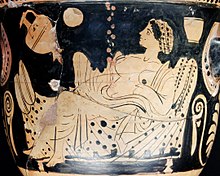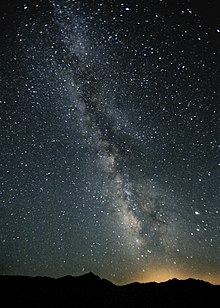Danaë
daughter of Acrisius of Argos and Queen Eurydice, mother of Perseus, in Greek mythology
In Greek mythology, Danaë (Ancient Greek: Δανάη, Danáē) was an Argive princess and mother of the hero Perseus by Zeus. She was credited with founding the city of Ardea in Latium during the Bronze Age.

Where no love was, lov’d a Showr
—John Fletcher

—Simonides of Ceos

And entretaine the golden shoure so free,
That trikling falles into thy treasurie
—Thomas Nashe

—Alfred Tennyson
Quotes
edit- Ὅτε λάρνακι ἐν δαιδαλέᾳ, ...
- Simonides of Ceos, Fragment 543. Quoted by Dionysius Halicarnassensis, De compositione verborum, 26
- When, in the carven chest,
The winds that blew and waves in wild unrest
Smote her with fear, she, not with cheeks unwet,
Her arms of love round Perseus set,
And said: “O child, what grief is mine!
But thou dost slumber, and thy baby breast
Is sunk in rest,
Here in the cheerless brass-bound bark,
Tossed amid starless night and pitchy dark.
Nor dost thou heed the scudding brine
Of waves that wash above thy curls so deep,
Nor the shrill winds that sweep,—
Lapped in thy purple robe’s embrace,
Fair little face!
But if this dread were dreadful too to thee,
Then wouldst thou lend thy listening ear to me;
Therefore I cry,—Sleep, babe, and sea, be still,
And slumber our unmeasured ill!
Oh, may some change of fate, sire Zeus, from thee
Descend, our woes to end!
But if this prayer, too overbold, offend
Thy justice, yet be merciful to me!”- J. A. Symonds Jr., Studies of the Greek Poets, 1st series (2nd ed., 1877), p. 160
- Adrift in the carven ark,—by the winds
And the rising waves dismayed,
Her limbs all quivering with alarm,
Her pale cheek wet with tears,—her arm
Round Perseus then she laid;Saying, “O my child, how sore my trouble.
And thou still slumbering deep!
Here in the dismal rivetted ark,
In the rayless night, in the pitchy dark,
Thine infant spirit—asleep!“Wash of the racing wave goes past
Above thy silken hair;
Yet whether of wave or bellowing blast
Not a thought is thine, or care,—
In mantle of crimson warm and fast,
Little face, how sweet and fair!“Yet if this fear were fear indeed,
If fear were fear of thine,
Surely thy small ear then had listened
To hear these words of mine ...“Sleep on then, O my baby, sleep,
And sleep, thou Sea;
Rested in sleep, I pray, at length
Our infinite sorrows be.
O Father in Heaven, vouchsafe ere long
Sign of some change in thee:
And if these hopes I breathe be wrong
Or too bold,—pardon me!”- W. G. Headlam, A Book of Greek Verse (1907), pp. 48-51
- When, in the carven chest,
- Simonides of Ceos, Fragment 543. Quoted by Dionysius Halicarnassensis, De compositione verborum, 26
- For know, that vnderneath this radiant floure
Was Danaes statue in a brazen tower,- Christopher Marlowe, Hero and Leander, First Sestyad
- Alass! alass! that loue should be a sinne!
Euen now my blisse and sorrowe doeth beginne.
Hould wyde thy lapp, my louelie Danae,
And entretaine the golden shoure so free,That trikling falles into thy treasurie.
As Aprill-drops not half so pleasant be,
Nor Nilus overflowe to Ægipt plaines
As this sweet-streames that all hir ioints imbaynes.- Thomas Nashe, The Choise of Valentines (wr. 1592 or 1593; pub. 1899)
- Variants: 185. Euen, even; blisse and sorrowe doeth, ioyes and sorrowes doe. 186. lapp, lappe; louelie, louely. 187. entretaine the, entertaine this; shoure so free, showry see. 188. trikling falles, drisling fall(es); treasurie, treasurye. 189. As Aprill-drops, Sweete Aprill flowers; half so, halfe soe. 190. overflowe to Ægipt-plaines, overfloweinge Egipt playne. 191. As this sweet-streames, as is the balme; hir ioints imbaynes, her woombe destreynes.
- Danae in a Brazen Tower,
Where no love was, lov’d a Showr.- John Fletcher, Valantinian (1647), act I, sc. 4
- Thou like a sea of milke shalt lye display’d,
Whilst I the smooth, calme Ocean, invade
With such a tempest, as when Jove of old
Fell downe on Danae in a storme of gold:- Thomas Carew, "A Rapture", Poems (1640)
- Miss DANAE, when Fair and Young
(As HORACE has divinely sung)
Could not be kept from JOVE’s Embrace
By Doors of Steel, and Walls of Brass.
The Reason of the Thing is clear;
(Would JOVE the naked Truth aver:)
CUPID was with Him of the Party;
And show’d himself sincere and hearty:
For, give That Whipster but his Errand,
He takes my Lord Chief Justice’ Warrant:
Dauntless as Death away He walks;
Breaks the Doors open; snaps the Locks;
Searches the Parlour, Chamber, Study;
Nor stops, ’till He has CULPRIT’s Body.- Matthew Prior, "An English Padlock" (1705)
- Now lies the Earth all Danaë to the stars,
- Alfred Tennyson, The Princess (1847), VII
- I think I see you when you wake,
And rub your eyes for me, and shake
My gold, in rising, from your hair,
A Danaë for a moment there.- D. G. Rossetti, "Jenny", Poems (1870)